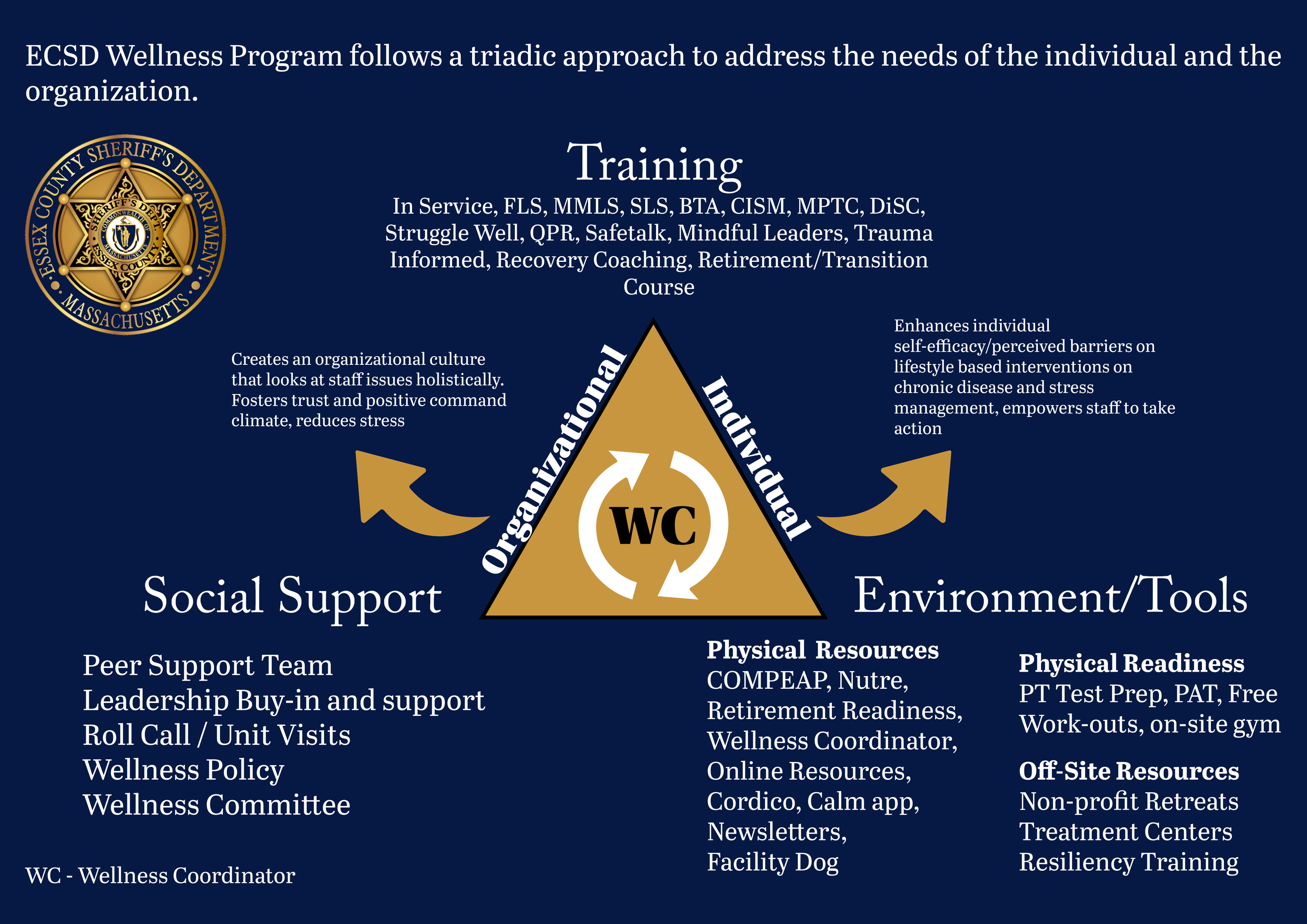
About Me
Hi I’m Dave Fielding and I’m a Health Promotion and Management graduate student at Merrimack College. Prior to this I was a Green Beret and Intelligence officer. Performing at a high level was a necessity in my career, and I would like to enable the same for law enforcement. Currently I am the health and wellness coordinator for Essex County Sheriff’s Department. I have spent the majority of my graduate degree studying the higher rates of chronic diseases and illnesses in law enforcement populations. An often overlooked population is the Correctional Officer. For my Needs Assessment I look deeply into the health issues facing Correctional Officers and interventions to implement an effective health and wellness program.
My Why.
Sources:
Parks, K. M., & Steelman, L. A. (2008). Organizational wellness programs: A meta-analysis. Journal of Occupational Health Psychology, 13(1), 58-68.
Baicker, K., Cutler, D., & Song, Z. (2010). Workplace wellness programs can generate savings. Health Affairs, 29(2), 304-311.
Berry, L. L., Mirabito, A. M., & Baun, W. B. (2010). What's the hard return on employee wellness programs? Harvard Business Review, 88(12), 104-112.
As a former Special Forces operator and intelligence officer I know first-hand about working and performing under chronic high stress. It is a fact of life for our law enforcement officers and they need all the help they can get. With lower life-expectancy, higher rates of chronic disease and illness, it is no wonder why every department struggles to keep up with sick-time and the second/third order effects of its usage. Like the demands of war, the demands of law enforcement careers are not going to change, but we can invest in ourselves to keep doing the job we spent our childhoods dreaming of doing.
Enter Wellness.
I champion 1% changes.
No fad diets.
No extreme work-outs.
No woo-woo wellness trends.
Wellness isn't about drastic changes - it's about small, deliberate steps taken consistently. Research shows that it takes an average of 66 days for a new behavior to become automatic, highlighting the importance of sustainable habits. These daily choices transform into powerful habits that shape our long-term health and vitality.
Like compound interest building wealth over time, each positive wellness decision multiplies its impact on our overall well-being. Studies indicate that workplace wellness programs can generate a return on investment of $1.50 to $6.00 for every dollar spent on employee health initiatives.
The impact of employee wellness is substantial: organizations with effective wellness programs report 28% lower sick leave usage, 26% lower healthcare costs, and 30% lower workers' compensation and disability claims. Additionally, healthy employees are 25% more likely to perform better at work and report 41% lower health-related productivity losses.
Beyond the workplace, employees who maintain healthy habits report 66% higher life satisfaction scores and are three times more likely to be engaged in their work. This creates a positive cycle where improved well-being leads to enhanced job performance, which in turn contributes to a more fulfilling personal life.
By investing in small, consistent wellness practices today, we're not just improving immediate health outcomes - we're building a foundation for lasting physical, mental, and emotional well-being that extends far beyond the workplace.
Say Yes to Wellness.
Capstone Project
I completed a needs assessment focusing on correction officers. An often overlooked population of the law enforcement community.
A corrections officer (CO) or prison officer, is a law enforcement professional who is responsible for overseeing individuals who have been arrested and are awaiting trial or who have been sentenced to serve time in jails, prisons, or other types of correctional facilities.
Their primary duties include:
Maintaining security and order within correctional facilities
Supervising inmate activities and ensuring compliance with facility rules
Conducting regular inspections and security checks
Managing inmate transportation and escort duties
Responding to emergencies and disturbances
Facilitating inmate rehabilitation programs
Corrections officers work in challenging environments that can be physically demanding and emotionally stressful. They typically work in shifts, including nights, weekends, and holidays, as correctional facilities operate 24/7. The role requires strong interpersonal skills, physical stamina, and the ability to remain calm under pressure.
What makes A CO?
EVIDENCE
After an extensive literature review, informant interviews, and a mini case-study, here are the major risk factors facing the CO population.
Lower Life expectancy
The average life expectancy is 16 years less than the national average.
Higher Rates of Cardiovascular Disease
31% of men and 25% of women have hypertension. The population also has higher levels of total cholesterol vs. the general population.
higher rates of PTSD, suicide, suds.
31% of COs have reported serious psychological distress at some point in their careers. 70% of COs reported using alcohol. CO Suicide rate is 7 times the national average. Employee burnout and absenteeism have been observed as consistent issues.
HIGHER BMI
86% of COs are overweight and 55.8% are obese beating out the national average of 69% and 32%, respectively. In a survey collected from Essex County Sheriff’s Department only 1/4 of respondents reported eating fruit and vegetables everyday.
Reccomendations
A Team based peer-led health promotion program. The approach would address nutrition, sleep/fatigue, health perceptions, mental health, stress, and burnout. The purpose would be to create positive peer pressure for health behavior change.
Worksite nutrition and physical activity education to improve knowledge and skills. Workplace programs to support healthy dietary habits such as offering more nutritious food options in staff dining areas or making healthy choices more accessible.
Establishing a peer mentoring program, especially for new COs could help prevent burnout rates and slow declines in health behaviors.
A mental health support system that offers a variety of methods for employees to seek care. Access to mental health providers specializing in law enforcement and strengthening current peer support networks. In addition health promotion activities to reduce the stigma associated with seeking mental health treatment.










